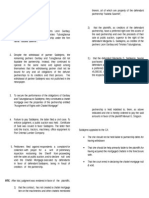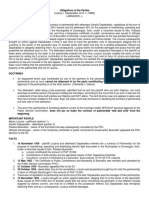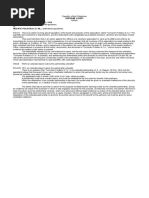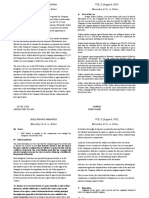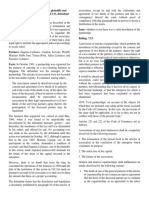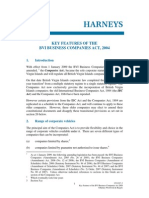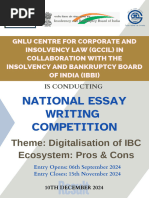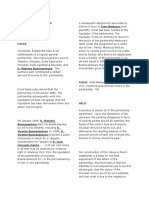0 ratings0% found this document useful (0 votes)
2K viewsMagdusa Vs Albaran
This document summarizes a court case regarding a dispute over a verbal partnership. The partnership was formed between Gregorio Magdusa and others to sell general merchandise, with Magdusa contributing capital and the others contributing labor. The partners agreed to split profits. Later, some partners wanted to withdraw, so Magdusa calculated their shares. When he refused payment, they sued. The lower court dismissed due to lack of all partners being included. The appeals court reversed, finding not all partners were necessarily involved. The issue was whether the case could proceed without all partners, as they have interest in partnership assets and debts. The court found the case could not proceed, as a partner's share depends on settling debts and liabilities, which
Uploaded by
zombie214Copyright
© © All Rights Reserved
We take content rights seriously. If you suspect this is your content, claim it here.
Available Formats
Download as DOC, PDF, TXT or read online on Scribd
0 ratings0% found this document useful (0 votes)
2K viewsMagdusa Vs Albaran
This document summarizes a court case regarding a dispute over a verbal partnership. The partnership was formed between Gregorio Magdusa and others to sell general merchandise, with Magdusa contributing capital and the others contributing labor. The partners agreed to split profits. Later, some partners wanted to withdraw, so Magdusa calculated their shares. When he refused payment, they sued. The lower court dismissed due to lack of all partners being included. The appeals court reversed, finding not all partners were necessarily involved. The issue was whether the case could proceed without all partners, as they have interest in partnership assets and debts. The court found the case could not proceed, as a partner's share depends on settling debts and liabilities, which
Uploaded by
zombie214Copyright
© © All Rights Reserved
We take content rights seriously. If you suspect this is your content, claim it here.
Available Formats
Download as DOC, PDF, TXT or read online on Scribd
You are on page 1/ 1
G.R. No.
L-17526 June 30, 1962
GREGORIO MAGDUSA, ET AL., petitioners,
vs.
GERUNDIO ALBARAN, ET AL., respondents.
Appellant and appellees, together with various other persons, had verbally formed a partnership de facto, for the
sale of general merchandise to which appellant contributed P2,000 as capital, and the others contributed their
labor, under the condition that out of the net profits of the business, 25% would be added to the original capital,
and the remaining 75% would be divided among the members in proportion to the length of service of each.
ometime in !"5# and !"5$, the appellees e%pressed their desire to withdraw from the partnership, and
appellant thereupon made a computation to determine the value of the partners& shares to that date. 'he results
of the computation were embodied in the document drawn in the handwriting of appellant. Appellees thereafter
made demands upon appellant for payment, but appellant having refused, they filed the initial complaint in the
court below. Appellant defended by denying any partnership with appellees, whom he claimed to be mere
employees of his.
'he (ourt of )irst *nstance of +ohol dismissed the complaint on the ground that the other were indispensable
parties but had not been impleaded. ,pon appeal, the (ourt of Appeals reversed the decision, ruling that it is not
an action for a dissolution of a partnership and winding up of its affairs or li-uidation of its assets in which the
interest of other partners who are not brought into the case may be affected. 'he action of the plaintiffs is one
for the recovery of a sum of money with .regorio /agdusa as the principal defendant. 'he partnership, with
.regorio /agdusa as managing partner, was brought into the case as an alternative defendant only.
Iue0 1hether or not appellees& action can be entertained, because in the distribution of all or part of a
partnership&s assets, all the partners have no interest and are indispensable parties without whose intervention no
decree of distribution can be validly entered.
!e"#0
*t cannot be entertained. A partner&s share cannot be returned without first dissolving and li-uidating the
partnership, for the return is dependent on the discharge of the creditors, whose claims en2oy preference over
those of the partners3 and it is self4evident that all members of the partnership are interested in his assets and
business, and are entitled to be heard in the matter of the firm&s li-uidation and the distribution of its property.
'he li-uidation drawn by appellant is not signed by the other members of the partnership besides appellees and
appellant3 it does not appear that they have approved, authori5ed, or ratified the same, and, therefore, it is not
binding upon them. At the very least, they are entitled to be heard upon its correctness.
*n addition, unless a proper accounting and li-uidation of the partnership affairs is first had, the capital shares of
the appellees, as retiring partners, cannot be repaid, for the firm&s outside creditors have preference over the
assets of the enterprise, and the firm&s property can not be diminished to their pre2udice. )inally, the appellant
cannot be held liable in his personal capacity for the payment of partners& shares for he does not hold them
e%cept as manager of, or trustee for, the partnership. *t is the latter that must refund their shares to the retiring
partners. ince not all the members of the partnership have been impleaded, no 2udgment for refund can be
rendered.
You might also like
- Aguila JR v. Court of Appeals, G.R. No. 127347, November 25, 1999100% (2)Aguila JR v. Court of Appeals, G.R. No. 127347, November 25, 19991 page
- 1 Agad vs. Mabato, G.R. No. L-24193, June 28, 1968No ratings yet1 Agad vs. Mabato, G.R. No. L-24193, June 28, 19684 pages
- Art. 1380. Contracts Validly Agreed Upon May Be Rescinded in The Cases Established by LawNo ratings yetArt. 1380. Contracts Validly Agreed Upon May Be Rescinded in The Cases Established by Law7 pages
- MOTION TO VOID JUDGMENT, DISMISS, OR RECUSE JUDGE - Cleaned100% (25)MOTION TO VOID JUDGMENT, DISMISS, OR RECUSE JUDGE - Cleaned11 pages
- Island Sales Vs United Pioneers 65 SCRA 554100% (3)Island Sales Vs United Pioneers 65 SCRA 5542 pages
- 08 Alfredo N. Aguila, JR vs. CA and Felicidad S. Vda. de Abrogar100% (2)08 Alfredo N. Aguila, JR vs. CA and Felicidad S. Vda. de Abrogar2 pages
- 16 Jo Chung Cang Vs Pacific Commercial CompanyNo ratings yet16 Jo Chung Cang Vs Pacific Commercial Company2 pages
- Jo Chung Cang Vs Pacific Commercial Co., 45 Phil. 142No ratings yetJo Chung Cang Vs Pacific Commercial Co., 45 Phil. 1423 pages
- Leyte-Samar-Sales and K. Tomassi v. S. Cea and O. CastrillaNo ratings yetLeyte-Samar-Sales and K. Tomassi v. S. Cea and O. Castrilla1 page
- Topic Digested By: Title of Case Case No. & Date of PromulgationNo ratings yetTopic Digested By: Title of Case Case No. & Date of Promulgation2 pages
- Philex Mining Corp. v. Commissioner of Internal Revenue, 551 SCRA 428 (2008)No ratings yetPhilex Mining Corp. v. Commissioner of Internal Revenue, 551 SCRA 428 (2008)2 pages
- Aurelio Litonjua JR Vs Eduardo Litonjua SR Digest67% (3)Aurelio Litonjua JR Vs Eduardo Litonjua SR Digest3 pages
- Lozana vs. Depakakibo GR No. L-13680, April 27, 19600% (1)Lozana vs. Depakakibo GR No. L-13680, April 27, 19602 pages
- Profile PKG Insolvency Professional 18.06.2024No ratings yetProfile PKG Insolvency Professional 18.06.20242 pages
- CHAPTER 5 Corporate Liquidation and Reorganization Problem 5 Requirement ANo ratings yetCHAPTER 5 Corporate Liquidation and Reorganization Problem 5 Requirement A6 pages
- Petition For Appointment of General ReceiverNo ratings yetPetition For Appointment of General Receiver6 pages
- British Virgin Islands Business Corporations Act Key Provisions and SummaryNo ratings yetBritish Virgin Islands Business Corporations Act Key Provisions and Summary24 pages
- Implementation of UNCITRAL Model Law On Cross-Border Insolvency in Great BritainNo ratings yetImplementation of UNCITRAL Model Law On Cross-Border Insolvency in Great Britain44 pages
- GCCIL-IBBI National Essay Writing Competition, 2024 (Updated)No ratings yetGCCIL-IBBI National Essay Writing Competition, 2024 (Updated)6 pages
- WEEK 4-BANCO FILIPINO SAVINGS AND MORTGAGE BANK vs. THE MONETARY BOARDNo ratings yetWEEK 4-BANCO FILIPINO SAVINGS AND MORTGAGE BANK vs. THE MONETARY BOARD3 pages








